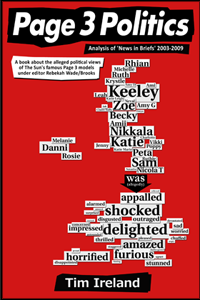This entry was posted on
Tuesday, May 20th, 2008 at
9:30 am and is filed
under UK Libel Law.
Libel tourism is the new hotness and our milkshake brings all the boys to the yard.
UK libel law is also making life increasingly difficult for those of us who like to speak our minds via Teh Interwebs.
These are, to my mind, the two aspects of UK libel law that deserve the most immediate attention from the folks online, but if you think that there are others that are of a higher priority (or even more likely to bend with the wind), then now is the time to speak up on your own blog or under comments:
–
The Demon Almost-Precedent: the Legacy of Laurence Godfrey
The roots go a wee bit deeper and it’s not as set in stone as some people would have you think, but since Demon settled over the Laurence Godfrey libel case eight years ago, it has been generally accepted that ISPs and other providers of web hosting services can under UK law be sued for libel over material transmitted through a largely automated carrier service.
Things are different in the US; Section 230 protects the providers of carrier services and instead puts the legal onus on the true publishers; those who consciously present, arrange, edit, coordinate or create content for publication (e.g. the submitters of comments, the authors of blogs, the editors of portals, etc.)
But here in the UK, the people who own the transmitter are publishers from the moment of transmission.
From that moment, the only defence left to them is one of ‘innocent dissemination’… and this is why the ‘notice and takedown’ method works so well; a lawyer gives notice, the ISP panics, takedown follows.
You can still be held legally responsible for what you submit to websites (under your control or the control of others)… however, thanks to Godfrey v. Demon Internet Limited, you can be neatly bypassed at any time by someone who wants to remove what you’ve published but cannot or will not challenge it in court.
–
The Bastard Duke of Brunswick
Again, we come back to that moment of transmission, except this time it doesn’t stop there; each time a web page is reloaded in this country, that’s counted as a fresh transmission, and therefore a fresh publication.
This concept was first introduced to law over a 150 years ago by the Bastard Duke of Brunswick a man who once boasted that, if it weren’t for his great wealth, he would have been in an insane asylum
Instead, he decided to roam free and infect our legal system with his special brand of crazy.
(This, in my view, is what makes him a bit of a bastard… but please feel free to use the title ‘Batshit Duke of Brunswick’ if you prefer it. In fact, you can say almost anything you like about him now that he’s dead.)
In 1998, the law on limitation periods for civil claims in the UK was described as “needlessly complex, outdated and, in some respects, unfair”. A few years later, limits for claims of libel were rendered all but meaningless in a digital age after Brunswick’s bullshit was applied to websites in Loutchansky v. The Times Newspapers Limited.
As it stands, any UK newspaper or magazine wishing to make an archive of their articles available online must be prepared to prove all over again that what they published umpteen years ago was true. Even archive services such as LexisNexis are vulnerable (as one inventive and secretive ‘blogger’ has shown).
Also, someone could choose to initially ignore something you published about them on your website or weblog and then surprise you with a claim of libel in 5, 10 or 20 years time; that’s a long time to expect anyone to maintain evidence and/or contact with relevant witnesses.
There are already quite a few bloggers with content of this vintage. Very few of them will be aware how (and when) it might be used against them with an ambush claim.
Again, the folks in the US shame us with a superior level of common sense on this matter.
–
[WARNING: The legal status of web users as publishers and their subsequent individual/collective responsibilities is a matter that’s likely to come up and be widely misunderstood and disagreed upon… in a conversation involving an unknown number of people wishing to stay anonymous while pretending to be more than one person. Just so you know. Oh, and there’s a minor communication/motivation problem on the horizon; those who aren’t paying attention may wonder why we should fight to give ISPs immunity from liability when all they’ve done so far is punk out on us.]




By Letters From A Tory May 20, 2008 - 10:40 am
Sadly people like Alisher Usmanov have great fun taking advantage of our libel laws and the lack of protection for bloggers.
By jailhouselawyer May 20, 2008 - 1:15 pm
I find it incredible that the McCanns instigated an action against the former director and a former journalist of the former Portuguese publication T&Q, for defamation of character.The story is herehttp://prisonersvoice.blogspot.com/2008/05/mccann…The headline ran: "PJ believes that parents killed Maddie". The McCanns claim that it led public opinion to turn against them. In my view, it was fair comment, and the tide of public opinion had turned against the McCanns long before the publication of the article.The McCanns instigated the criminal libel proceedings whilst still in Portugal and before they became official suspects in the disappearance of Madeleine. They then fled back to the UK, still leaving police questions unanswered about their involvement in the disappearance of Madeleine.I suspect that behind the McCanns defamation claim is the desire to expose whoever it was within the PJ who had leaked the story to T&Q.I think that bloggers should be getting on this case because it smells of big money and influence being used to silence legitimate criticism.
By Manic May 20, 2008 - 2:26 pm
JHL: We'll be dealing with the wider issue, not specific cases.
By jailhouselawyer May 20, 2008 - 3:10 pm
"…but if you think that there are others that are of a higher priority (or even more likely to bend with the wind), then now is the time to speak up on your own blog or under comments:".Sometimes to see the bigger picture it helps if you take off the blinkers.There is a bigger threat here than you might imagine.If I'm wrong, I owe you a pint. If your wrong, you owe me a pint.Deal or no deal?
By schrodingerspig May 20, 2008 - 3:25 pm
This strikes a chord locally, our MP recently silenced a blogger over a parody site.http://www.shropshirestar.com/2008/05/12/mps-ange…So I've decided to publish a post against him. Lets see what happens. :)http://schrodingerspig.wordpress.com/2008/05/20/c…
By Manic May 20, 2008 - 3:31 pm
You'll have to spell it out for me sorry, JHL. What specific aspect of UK law are they exploiting that we might want/hope to change?
By jailhouselawyer May 20, 2008 - 9:25 pm
OK, I will do. It will take a bit of time. Meanwhile, Google has this "However, the link between the McCanns and Gordon Brown is a tenuous one, which is unimportant. The thing is that it is a dangerous one". And provides this link but the words have, like Madeleine, mysteriously disappeared.http://www.timesonline.co.uk/tol/comment/columnis…I wonder why? More to the point, the Telegraph has censored me on a story in relation to the McCanns once it was published. Who and why were the strings pulled? I picked it up from T&Q, 24 Hours, the McCannfiles website and the BBC. It's the same story I put on my blog and the link is higher up in your comments.
By Bartholomew May 21, 2008 - 10:21 am
The case concerning David Wright MP raises the issue of parody as "commentary" vs "passing off", and so there's a huge subjective element involved. In the USA Jerry Falwell sued Larry Flynt over a fake interview in Hustler in which Falwell fondly recalled losing his virginity to his mother; the case failed because the judge ruled that no one would reasonably believe the interview was genuine. As Tim has indicated, such US decisions might be of use in UK campaigning.The issue of re-publishing libel is a tricky one. I was once asked for "strict proof" of details in an old newspaper article (from 1984) I had cited, and I was obliged to make trips to the British Library to look at other reports, and to put some effort and expense into tracking various witnesses down (nothing came of the threat). It should be noted that simply providing an old report, or even an old journalist, does not in itself count as evidence if you get sued. One journalist I emailed about a 1984 piece had no memory of even writing it.
By Manic May 21, 2008 - 2:37 pm
Thus making the ambush all the more dangerous. Or lucrative, depending on your point of view.
By schrodingerspig May 21, 2008 - 2:48 pm
Perhaps we all need to dust off our scrapbooks, and get out the pritsticks?"Here's where you played a shepherd in the school nativity, oOo and this one is the source for that awful libel case.."